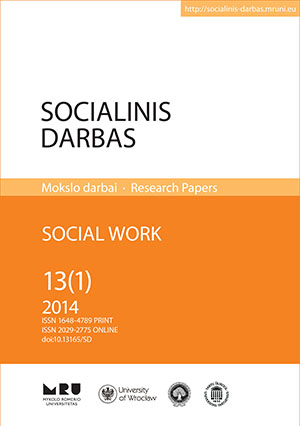Socialinio darbo studentų požiūris į tarptautinį socialinį darbą
Attitudes of Social Work Students to International Social Work
Author(s): Jolanta PivorienėSubject(s): Social Sciences
Published by: Mykolas Romeris University
Keywords: international social work; ways of involvement in international social work activities; students experience and involvement in international social work
Summary/Abstract: Since 1943, when the definition of international social work was mentioned, its meaning and content have developed, and at the beginning of the 21st century it became a popular analysis object of social work researches and practitioners. However, in Lithuania, international social work has not been studied and there are no sound researches about this issue. The goal of the article is to investigate the opinion of social work students about their understanding of international social work and students’ involvement in different international social work activities. The article is based on survey data. All final year social work students at one university were investigated using a questionnaire. Research data shows that students define international social work very closely to scientifically accepted definitions. They agreed with most of the statements describing international social work, however, the impact of globalization to social work clients was assessed neutrally. Respondents think that international social work is very important to service users and social work development and it is less important for social workers. More than one half of the participating students did not communicate with foreign students during their studies, but almost one half of the respondents met foreign clients during field placement. It seems that social reality is more favourable for international social work than university environment. On the other hand, data shows that universities put a big emphasis on internationalization. The students defined that they often participated in international conferences, lectures, projects, seminars. Teachers were defined as the main factor, which encouraged students to get involved into international social work activities at home or abroad. Students’ opinion reflects public (and professional) opinion, which is more favourable to local than international understanding of social work. International social work in Lithuania is understood in its narrow definition (as the first form defined by Seden et al.). The situation reminds the discussions at the end of the 20th century in Lithuania about what social work is, why it is needed, etc. Similarly now, the notion of international social work has to prove its necessity to Lithuanian researchers and practitioners.
Journal: Socialinis darbas
- Issue Year: 13/2014
- Issue No: 1
- Page Range: 6-15
- Page Count: 10
- Language: Lithuanian

